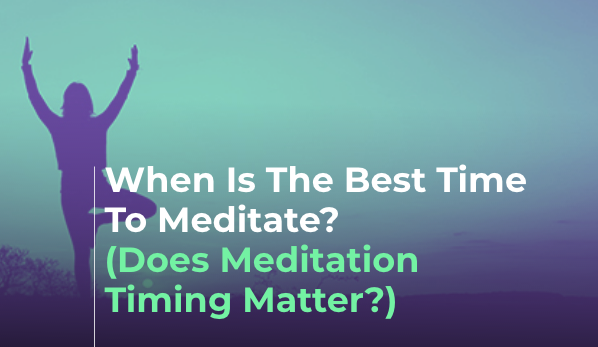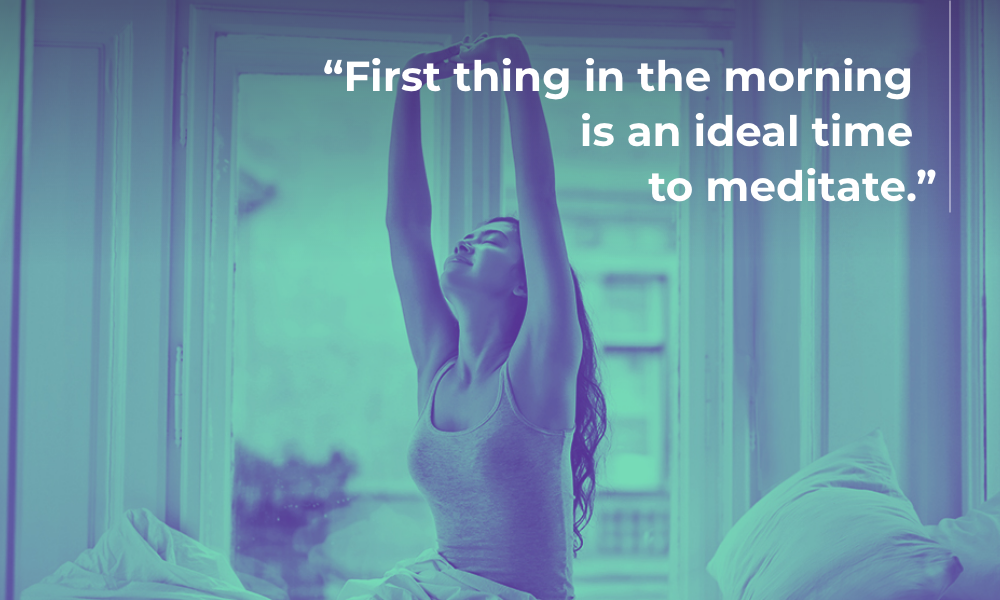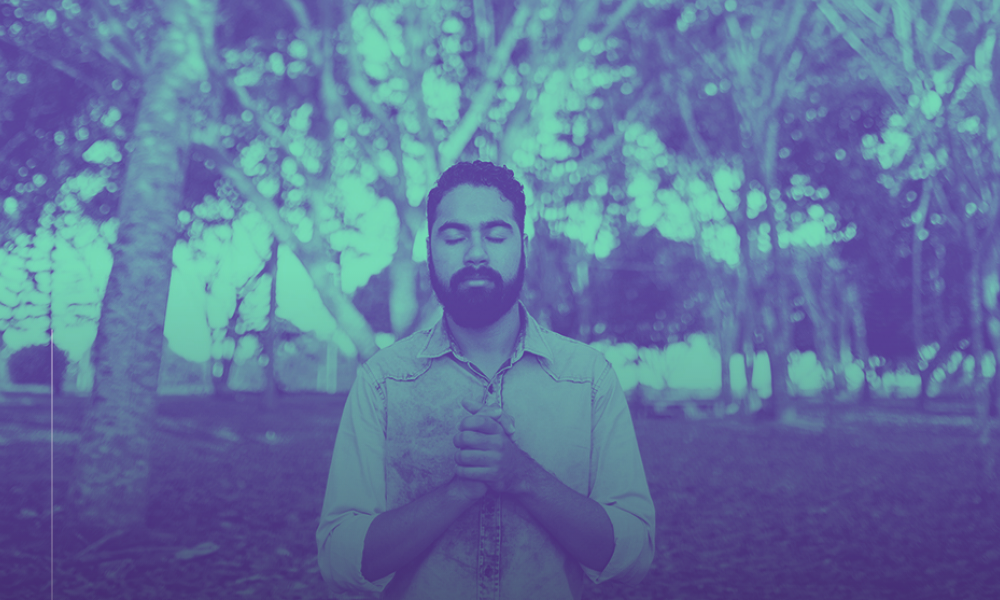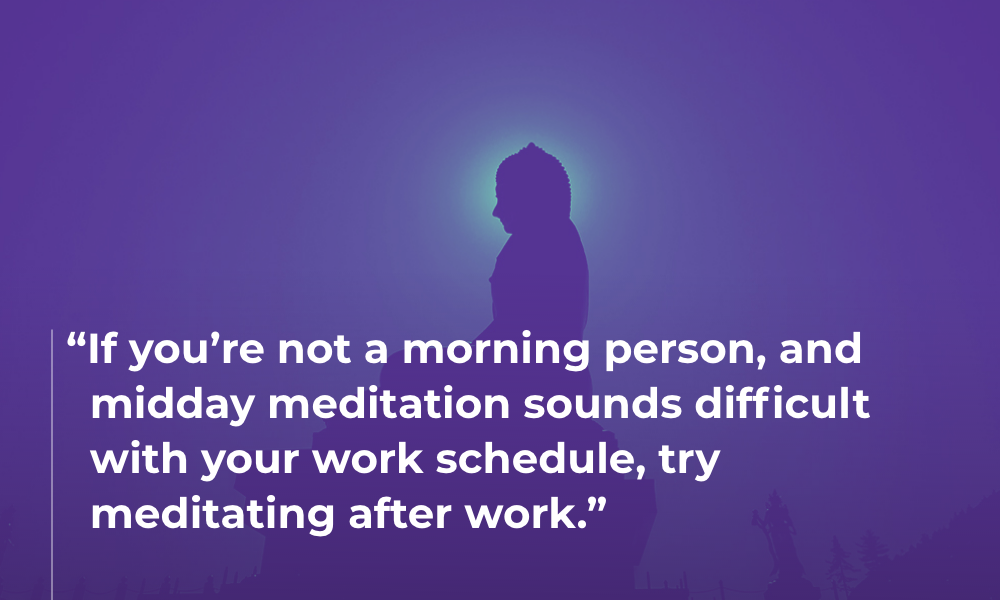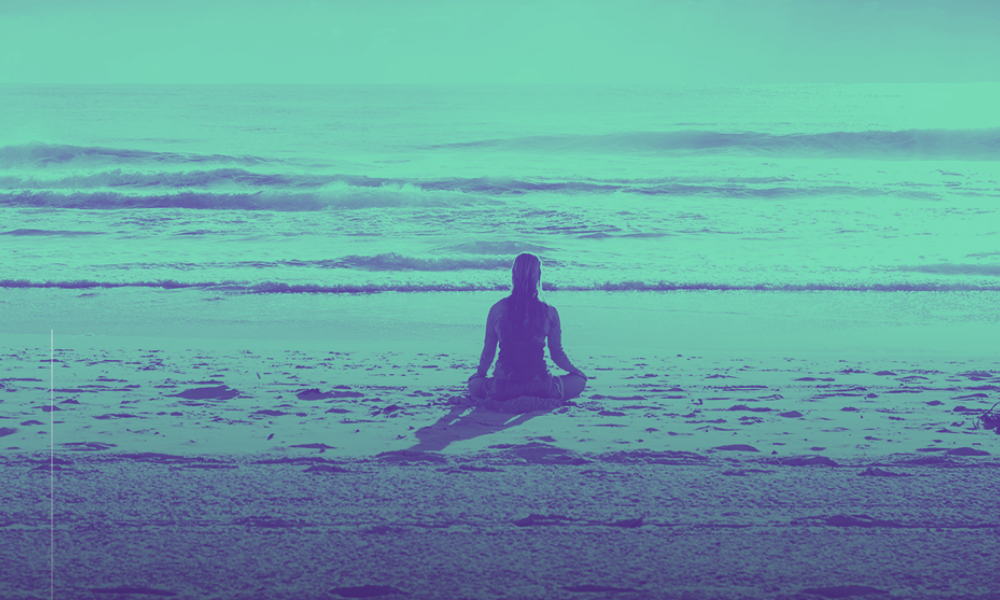A regular meditation practice has a nearly endless amount of benefits. From reduced stress and anxiety to increased productivity and better physical health, there’s little that meditation doesn’t improve. But is there a best time of day to meditate? The answer is: It depends on who’s doing the meditating! Keep reading to learn about the three main times of the day to meditate and the pros and cons of each.
Plus, find out which option might be best for you.
Benefits of Meditation
Before we get into the best time to meditate, let’s make sure you know why you’re meditating. Here are just a few of the science-backed benefits to a regular meditation practice:
- Reduces stress. Stress causes inflammation in the body, which leads to a host of health problems, like heart disease and diabetes. In addition to helping you manage your stress levels, a regular meditation practice also reduces the inflammation caused by stress.
- Enhances focus. Do you often find your mind wandering? Try sitting in the present moment. Studies show that people who practice mindfulness meditation regularly focus and pay attention better than their non-meditating peers.
- Improves sleep. If you’re tossing and turning at night, you may want to give meditation a try. It’s proven to help you get higher-quality rest.
- Lowers anxiety. If you experience bouts of anxiety, meditation can help. Those who meditate consistently can expect fewer symptoms of anxiety in their daily life.
- Reduces blood pressure. Meditation has been found to benefit the cardiovascular system. In one study, regular meditators experienced a healthy reduction in blood pressure over time.
- Increases sense of compassion. The benefits of meditation go beyond physical health benefits. It can also help you cultivate more sense of community and better well-being over time.
- Improves memory. If you often find yourself misplacing your keys, meditation can help. Sitting with your breath can improve your memory.
Best Time of Day to Meditate
Most people choose to meditate either in the early morning, midday, or evening. Here are a few pros and cons of each time frame:
Morning Meditation
First thing in the morning is an ideal time to meditate. In fact, it’s the time recommended by many experts because it’s when the world is most quiet and still.
Pros of Morning Meditation
- Morning meditation helps you start the day with calm energy.
- When meditation is a part of your morning routine, you don’t need to worry about fitting it into your schedule later in the day.
- You may feel less tempted to fall asleep during your morning meditation than if you were meditating after a long workday.
- It’s easier to sit with your breath because work, school, or other activities haven’t taken over your thoughts yet.
- When you meditate in the morning at home, you likely have a higher chance for a quiet session than you would in a crowded office or school.
Cons of Morning Meditation
- It may feel difficult to fit in meditation when you’re rushing to get ready for work or school. To remedy this, try waking up just five minutes earlier in the morning. Meditating for even that small amount of time can have a large impact.
- It’s easy to fall back into a sleep state if you meditate immediately upon waking up. Try having a glass of water and stretching before you begin your meditation, and don’t meditate lying down in bed.
Midday Meditation
If you have a busy workday, try a midday meditation. Midday is a perfect time to meditate for those who need to take a moment to pause and destress.
Pros of Midday Meditation
- Meditating on your lunch break (or any other time midday) gives you a respite from your busy day.
- Meditating midday can restore your dwindling energy, helping you finish the day strong.
- A midday meditation can help you release frustrations that may have built up during the first half of the day. Afterward, you can give your full attention to the remaining projects of the day.
- Your body gets a break from whatever type of work you do (whether that’s manual labor or hunching over a computer).
- It allows you to make the most of your lunch hour.
- If you choose a walking meditation, you can get some exercise in.
Cons of Midday Meditation
- Depending on your work environment, it may be hard to find a quiet place to meditate. If you’re struggling to find a quiet space, try hitting the pavement! A walking meditation is just as restorative as a sitting one.
- You may feel rushed to get back to work. If this is the case, try blocking off 10 or 15 minutes on your work calendar each day for meditation. That way, you feel less of a need to use that time for work tasks.
Evening Meditation
If you’re not a morning person, and midday meditation sounds difficult with your work schedule, try meditating after work. Evening meditations are a great way to signal to your body that your hectic workday has ended, and now it’s time for rest.
Pros of Evening Meditation
- Meditating in the evening can relieve tension after a long day.
- Meditating when you get home from work helps you create a mental divide between your work and your personal life.
- An evening meditation can make it easier to fall asleep later in the night.
- You may feel less rushed meditating in the evening than you would in the morning or afternoon.
- Depending on your living and work situation, an evening meditation may feel quieter than any other time of day.
Cons of Evening Meditation
- If you’re very tired from your day, you may fall asleep during evening meditation. If this is the case, try a standing or walking meditation practice instead.
- It may be harder to calm your thoughts after a full day of work and activities. (However, meditation helps with this, so you will likely find that this is less of an issue over time.)
Is There a Best Time to Meditate?
Any time is a good time to meditate. Some yogis recommend meditating in the two hours before sunrise—these are sometimes referred to as the “ambrosial hours”—because they believe that time carries a special energy. Plus, it’s when the earth is thought to be the most silent. So if you want to meditate when the “experts” do, choose morning.
Otherwise, you can meditate anytime you’re feeling stressed, anxious, or low on energy. We do recommend trying to meditate at the same time every day so that it becomes a regular part of your daily routine. Feel free to experiment to see what time works best for you.
You’re not stuck with one schedule just because you’ve followed it for a couple of weeks!
Frequently Asked Questions About Meditation Times
Still have questions about when to meditate? Here are some of the queries we get most often.
Should I Meditate Before or After Exercise?
You can do either, but meditating after exercise is a great choice. Exercise can relieve some of the stress and anxious thoughts that distract you while meditating, so sitting after you exercise may be more beneficial. Also, exercise can relax your muscles, making it easier to sit still for your meditation session.
That said, you may want to meditate for a few minutes before your workout if you’re doing a type of exercise that emphasizes a strong mind-body connection, (like yoga or pilates). Meditating beforehand may help you feel more tuned in to the movements.
Is it Better to Meditate in the Morning or Evening?
It’s perfectly acceptable to meditate in both the morning and evening (and also midday!). However, many experts suggest meditating in the morning because you have energy and are not yet distracted by the day’s tasks.
Is it Bad to Meditate at Night?
It’s not bad to meditate at night, and in fact, many people prefer it. The only concern some practitioners have about meditating at night is that they may fall asleep when it isn’t their goal to fall asleep. To prevent this, stay hydrated, avoid meditating in your bed, and don’t do it too close to bedtime.
How Many Times a Day Should I Meditate?
For most people, meditating one to two times per day is enough to see improvements in their physical health, mental health, and overall well-being. But you can meditate as many times per day as you’d like. Even a brief two-minute meditation during a stressful moment in your day can be impactful.
Meditation Tips to Get the Most out of Your Meditation Time
To get the most out of your meditation practice any time of day, try the following tips:
- Choose a calm, quiet location for your meditation session.
- Remove distractions and silence notifications on tech devices before you begin your practice.
- If possible, ask the people around you to refrain from making excess noise for the duration of your meditation session.
- Once you’ve determined the best time of day for you to meditate, build it into your routine so you don’t miss a session.
- Customize your meditation experience further by choosing a meditation position that works for you.
- Use a meditation app like Primed Mind to help you stay on track with your practice and tune into your session, wherever you may be.
- If you’re having trouble remembering to meditate, try tethering it to another activity. For example, you can decide that you’ll meditate every morning after you finish your smoothie or every afternoon after your 2:00 meeting.
Using Primed Mind to Meditate Any Time of Day
Remember that the best time to meditate isn’t the same for everyone. You can meditate in the morning, midday, or the evening. Just don’t go the entire day without meditating!
So, choose your favorite time and try a meditation technique. Regardless of when you meditate, it’s a good idea to use an app to keep yourself focused and on track. Especially if you’re meditating in a crowded office (or at home with energetic kids!), it can be helpful to plug in headphones and tune in to a voice guiding you through your session.
Primed Mind is a guided meditation app that’s free to download. It unlocks your full potential by showing you how to tap into powerful areas of your mind. You’ll be able to break through roadblocks, visualize success, and achieve your goals, all from your smartphone or tablet.
Primed Mind has meditation sessions for every time of the day, like our Start Your Day Power Primer for the morning or our Better Sleep Course for the evening. Choose a meditation time and try us out today!

